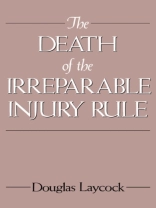The irreparable injury rule says that courts will not grant an equitable remedy to prevent harm if it would be adequate to let the harm happen and grant the legal remedy of money damages. After surveying more than 1400 cases, Laycock concludes that this ancient rule is dead–that it almost never affects the results of cases. When a court denies equitable relief, its real reasons are derived from the interests of defendants or the legal system, and not from the adequacy of the plaintiff’s legal remedy. Laycock seeks to complete the assimilation of equity, showing that the law-equity distinction survives only as a proxy for other, more functional distinctions. Analyzing the real rules for choosing remedies in terms of these functional distinctions, he clarifies the entire law of remedies, from grand theory down to the practical details of specific cases. He shows that there is no positive law support for the most important applications of the legal-economic theory of efficient breach of contract. Included are extensive notes and a detailed table of cases arranged by jurisdiction.
Douglas Laycock
Death of the Irreparable Injury Rule [PDF ebook]
Death of the Irreparable Injury Rule [PDF ebook]
قم بشراء هذا الكتاب الإلكتروني واحصل على كتاب آخر مجانًا!
لغة الإنجليزية ● شكل PDF ● ISBN 9780195362510 ● الناشر Oxford University Press ● نشرت 1991 ● للتحميل 6 مرات ● دقة EUR ● هوية شخصية 2278307 ● حماية النسخ Adobe DRM
يتطلب قارئ الكتاب الاليكتروني قادرة DRM












